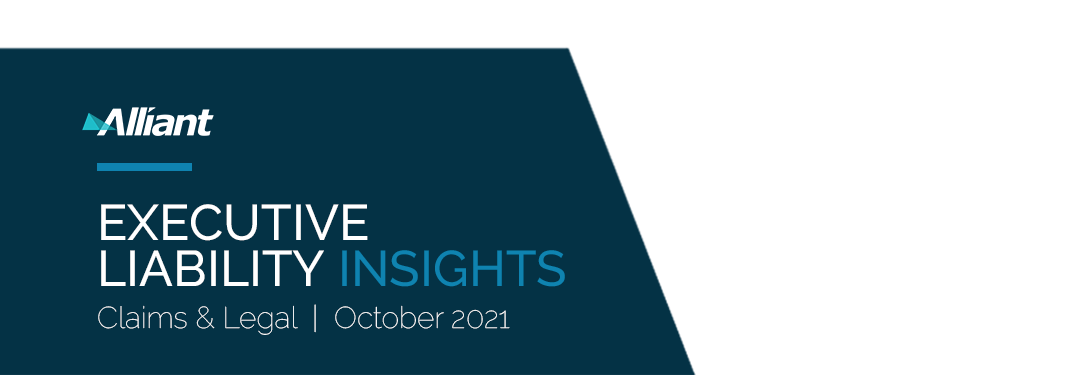
Navigating today’s complex risk environment can be a monumental task. Steve Shappell, Alliant Claims & Legal, spearheads Executive Liability Insights, a monthly review of news, legal developments and information on executive liability, cyber risk, employment practices liability, class action trends and more.
Table of Contents
ABSENT FINAL ADJUDICATION, D&O POLICY DOES NOT PRECLUDE COVERAGE FOR SETTLEMENT WHERE UNDERLYING CLAIM IS FRAUD
Astellas US Holding, Inc. v. Starr Indem. & Liab. Co., No. 17-cv-08220 (N.D. Ill. Oct 8, 2021)
This matter arose after a pharmaceutical company received a subpoena from the U.S. Department of Justice (“DOJ”) in connection with an investigation into alleged “Federal healthcare offenses” arising out of the company’s charitable donations.
Read More >>
DELAWARE CHANCERY RELIES ON NEW THREE PRONG DEMAND FUTILITY TEST IN DISMISSING DERIVATIVE ACTIONS
As discussed in the September 2021 edition of Executive Liability Insights, the Delaware Supreme Court set forth a new, more stringent, three-part demand futility test with its decision in Zuckerberg.
Read More >>
DIRECT LISTING SHAREHOLDER HAS STANDING TO PURSUE SECTION 11 CLAIM IN NINTH CIRCUIT
Pirani v. Slack Techs., Inc., No. 20-16419 (9th Cir. Sept. 20, 2021)
This matter arose after a software company went public via a “direct listing,” whereby shares that were both registered and unregistered with the U.S. Securities and Exchange Commission were made available for sale to the purchasing public.
Read More >>
BUMP-UP EXCLUSION IN D&O POLICY DOES NOT PRECLUDE COVERAGE FOR SETTLEMENT
Towers Watson & Co v. Nat’l Union Fire Ins. Co. of Pittsburgh, PA, et al., No. 1:20-cv-810 (E.D. Va. Oct. 5, 2021)
Shareholders of a professional services company filed several class action lawsuits arising out of the merger of the company with a large insurance brokerage firm.
Read More >>
FEES INCURRED DEFENDING AGAINST FORMER EMPLOYEE’S COUNTER CLAIMS MUST BE REIMBURSED BY D&O INSURER
Legion Partners Asset Mgmt., LLC v. Underwriters at Lloyd’s, London, No. N19C-08-305 AML (Del. Super. Ct. Sep. 30, 2021)
The case at hand arose after a former employee of an investment management company filed suit against the company and two of its principal officers alleging breach of fiduciary duty, wrongful termination, and violation of California’s whistleblower statute.
Read More >>
SOCIAL MEDIA COMPANY TO PAY MILLIONS TO SHAREHOLDERS IN DERIVATIVE ACTION SETTLEMENT
In re Renren, Inc. Derivative Litig., No. 653594/2018 (Sup. Ct. N.Y. Cty. Oct. 7, 2021)
A Chinese social network company reached a $300 million settlement in a derivative action filed by minority shareholders involving allegations that company executives drained the company of hundreds of millions of dollars.
Read More >>
PROFESSIONAL SERVICES EXCLUSION AND CONTRACT EXCLUSION DO NOT PRECLUDE COVERAGE FOR TRADE SHOW CANCELLATION UNDER D&O POLICY
Fed. Ins. Co. v. Healthcare Info. & Mgmt. Sys. Soc'y, No. 20 C 6797 (N.D. Ill. Oct. 19, 2021)
The underlying suit arose after a non-profit healthcare information technology company was unable to hold its annual global conference due to the COVID-19 pandemic.
Read More >>
UNDERLYING RELATED ACTS NEGATE COVERAGE UNDER CLAIMS-MADE POLICIES
As demonstrated by two recent cases in Florida and California, the timing of notices under claims-made policies is an essential aspect of securing coverage, particularly when it comes to prior or related wrongful acts.
Read More >>
EXCESS INSURERS MAY BE ON THE HOOK FOR COMPENSATORY DAMAGES PAID BY INSURED IN ARBITRATION AWARD
Computer Sciences Corp. v. Endurance Risk Sols. Assurance Co., No. 1:20-cv-01580 (S.D.N.Y Sep. 29, 2021)
This coverage litigation arose out of an arbitration in which the arbitrator determined an insured information technology company breached its contract to develop a new product for its client and awarded the client a hefty sum in “compensatory and direct damages.”
Read More >>
OFAC ISSUES GUIDANCE ON SANCTIONS COMPLIANCE FOR VIRTUAL CURRENCY INDUSTRY
The U.S. Department of the Treasury’s Office of Foreign Assets Control (“OFAC”) recently issued Sanctions Compliance Guidance for the Virtual Currency Industry, which outlines OFAC’s expectations for companies transacting in virtual currency.
Read More >>
PHARMACEUTICAL COMPANY SETTLES INVESTOR CLASS ACTION
Lehigh Cnty. Emps.’ Ret. Sys. v. Novo Nordisk A/S, et al., No. 3:17-cv-00209 (D.N.J.)
A Danish pharmaceutical company reached a $100 million settlement in an investor class action brought by a group of pension funds in New Jersey federal court.
Read More >>
CYBER CORNER
Click to read the following case:
- COURT REFUSES TO DISMISS DATA BREACH SUIT AGAINST IT SERVICE PROVIDER
Read More >>
EPL CORNER
Click to read the following cases:
- BIPA LAWSUITS TRIGGER DUTY TO DEFEND UNDER EPL COVERAGE
- FORMER EMPLOYEE AWARDED $137 MILLION IN RACIAL DISCRIMINATION SUIT
- COMPANY SETTLES WITH EEOC OVER SEXUAL HARASSMENT AND DISCRIMINATION SUIT
SEC CORNER
Click to read the following cases:
- SEC USES WHISTLEBLOWER PROGRAM TO ENCOURAGE TIMELY REPORTING OF WRONGDOING
- SEC GUIDANCE FOR MUTUAL FUNDS AND ETFS
- FORMER EXECUTIVES OF INVESTMENT ADVISOR FIRM SETTLE WITH SEC OVER INFLATED PERFORMANCE NUMBERS
- SEC ENFORCEMENT ACTIONS, SETTLEMENTS AND JUDGMENTS
SHAREHOLDER CORNER
October 2021 securities class action filings.
Read More >>
ABSENT FINAL ADJUDICATION, D&O POLICY DOES NOT PRECLUDE COVERAGE FOR SETTLEMENT WHERE UNDERLYING CLAIM IS FRAUD
Astellas US Holding, Inc. v. Starr Indem. & Liab. Co., No. 17-cv-08220 (N.D. Ill. Oct 8, 2021)
This matter arose after a pharmaceutical company received a subpoena from the U.S. Department of Justice (“DOJ”) in connection with an investigation into alleged “Federal healthcare offenses” arising out of the company’s charitable donations.
The company ultimately settled with the DOJ, which included a hefty payment described in the agreement as “restitution to the United States.” The pharmaceutical company sought coverage for the settlement under its directors and officers liability (“D&O”) policy, but the insurer declined to cover the matter, contending the settlement was excluded from the policy’s definition of “Loss” because it was uninsurable restitution or disgorgement of ill-gotten gains.
Coverage litigation ensued and the pharmaceutical company argued that at least that portion of the settlement not labeled as restitution constituted a covered “Loss.” The D&O policy defined “Loss” as “damages, settlements or judgments,” including the “multiplied portion of any multiple damage awards … but only to the extent that such damages … are insurable under the applicable law most favorable to the insurability of such damages.” The policy explicitly excluded from coverage “Loss in connection with any Claim” based upon or arising out of “the gaining of any profit or advantage or improper or illegal remuneration” and “any deliberate fraudulent act or any willful violation of law by an Insured,” but only if “a final non-appealable adjudication establishes that such remuneration was improper or illegal … [or] that such act or violation occurred.”
Finding in favor of coverage, the court held that the False Claims Act (“FCA”) allows “only for civil penalties and compensatory damages, not for restitution in the form of disgorgement,” and as such, the entirety of the settlement was necessarily insurable compensatory restitution. Even though the DOJ’s standard-form FCA release labels damages as “restitution to the United States,” the court noted, those damages are meant to “compensate the United States” to make it “completely whole,” and are thus insurable.
In finding the settlement aligned with public policy, the court reasoned that the pharmaceutical company did not admit to any wrongdoing or liability in the settlement agreement nor does public policy bar coverage for damages to the government (only for recovery of the proceeds of a fraud). Furthermore, Illinois case law does not prohibit coverage for claims involving allegations of fraud that settle before a trial, the court noted, adding it was unwilling to invent such a public policy.

DELAWARE CHANCERY RELIES ON NEW THREE PRONG DEMAND FUTILITY TEST IN DISMISSING DERIVATIVE ACTIONS
Multiple Cases
As discussed in the September 2021 edition of Executive Liability Insights, the Delaware Supreme Court set forth a new, more stringent, three-part demand futility test with its decision in Zuckerberg. Relying on the new test, the Delaware Chancery Court recently dismissed two derivative lawsuits.

- Patel v. Duncan
Firemen’s Ret. Sys. v. Sorenson
The Takeaway
It is likely that Delaware corporations will continue to benefit from these more stringent demand futility standards by retaining greater power and responsibility with respect to the pursuit of litigation against their boards.
DIRECT LISTING SHAREHOLDER HAS STANDING TO PURSUE SECTION 11 CLAIM IN NINTH CIRCUIT
Pirani v. Slack Techs., Inc., No. 20-16419 (9th Cir. Sept. 20, 2021)

This matter arose after a software company went public via a “direct listing,” whereby shares that were both registered and unregistered with the U.S. Securities and Exchange Commission were made available for sale to the purchasing public.
After the company’s stock suffered a decline in value, a shareholder brought a class action lawsuit under Sections 11 and 12(a)(2) of the Securities Act of 1933, alleging the registration statement was false and misleading because it did not alert prospective shareholders to the company’s competition in the marketplace nor to certain terms in the company’s service agreements.
The software company contended the shareholder “could not show that the securities he purchased, even if unregistered, were ‘of the same nature’ as those issued pursuant to the registration statement,” and therefore did not have standing to bring the suit. The court disagreed, however, noting that in a direct listing where only one registration statement exists, an investor is unable to determine whether they purchased registered or unregistered securities. Accordingly, if the language of Section 11 is interpreted such that it is only applicable to registered securities in a direct listing, the court stated, liability under Section 11 for false or misleading statements made in the direct listing registration statement could potentially be avoided. This, the court said, would create a loophole with the unintended consequence of encouraging companies to file “overly optimistic” registration statements, knowing that they would face no Section 11 liability. The court further found the shareholder likewise satisfied the standing requirement under Section 12 because all the shares he purchased through the direct listing, whether or not they were registered, were sold “by means of a prospectus.”
The Takeaway
The Ninth Circuit’s ruling here is significant because it was the first case by a U.S. Court of Appeals to have considered whether a shareholder plaintiff had statutory standing to pursue claims under Sections 11 and 12(a)(2) of the Securities Act of 1933 stemming from a direct listing even though he could not prove he purchased shares that were subject to the issuer’s registration statement and offering prospectus. It is essential for companies that could be subject to jurisdiction in the Ninth Circuit to ensure their registration materials do not contain potentially false or misleading statements that could subject them to liability, regardless of the mechanism employed for going public.
BUMP-UP EXCLUSION IN D&O POLICY DOES NOT PRECLUDE COVERAGE FOR SETTLEMENT
Towers Watson & Co v. Nat’l Union Fire Ins. Co. of Pittsburgh, PA, et al., No. 1:20-cv-810 (E.D. Va. Oct. 5, 2021)

Shareholders of a professional services company filed several class action lawsuits arising out of the merger of the company with a large insurance brokerage firm.
The complaints alleged the proxy materials for the transaction omitted certain information, which resulted in shareholders receiving less than adequate consideration for their shares.
After the suits settled, the professional services firm sought coverage from its directors and officers liability (“D&O”) insurers. While the insurers did not disclaim coverage for the costs to defend the actions, they refused to cover the settlement amounts, arguing coverage was precluded under the “bump-up” exclusion in the policy. The bump-up exclusion stated that, should a claim arise alleging the price “paid or proposed to be paid for the acquisition … of an entity is inadequate, Loss with respect to such Claim shall not include any amount of any judgment or settlement representing the amount by which such price or consideration is effectively increased.”
Coverage litigation ensued and in order to determine whether the bump-up exclusion applied to the transaction, the court looked to the “specific structure” and “overall result” of the transaction. The court observed that an acquisition is typically associated with the “takeover of one company by another,” as opposed to a merger, “which contemplates the combination of two companies into a single entity.” In noting the term “acquisition” was not defined in the D&O policy, the court concluded the structure of the transaction at issue was not a straightforward takeover and therefore refused to accept the insurers’ argument that it should be characterized as the type of “acquisition” referenced in the bump-up exclusion. Accordingly, the court held that under a narrow reading of the exclusion, there was coverage available for the settlements.
FEES INCURRED DEFENDING AGAINST FORMER EMPLOYEE’S COUNTER CLAIMS MUST BE REIMBURSED BY D&O INSURER
Legion Partners Asset Mgmt., LLC v. Underwriters at Lloyd’s, London, No. N19C-08-305 AML (Del. Super. Ct. Sep. 30, 2021)

The case at hand arose after a former employee of an investment management company filed suit against the company and two of its principal officers alleging breach of fiduciary duty, wrongful termination, and violation of California’s whistleblower statute.
Concurrently, the investment management company filed an arbitration demand alleging the employee violated his employment agreement. Since the former employee had signed an arbitration agreement, the matter proceeded to arbitration wherein the former employee asserted counterclaims against the company that largely repeated the allegations in his initial lawsuit.
The investment management company sought coverage for the suit and arbitration from its directors and officers liability (“D&O”) insurer. The insurer acknowledged coverage for the suit against the individual officers but not for the company. The insurer also denied coverage for the arbitration and refused to cover the company for any expenses associated with the suit or arbitration.
Coverage litigation ensued and the court noted that even where the insurer had a “duty to advance” rather than a “duty to defend,” Delaware courts construe both duties “broadly in favor of the policyholder” and the insurer’s duty to advance defense costs was triggered where a claim “could result in indemnity.” Accordingly, the court found the D&O policy’s coverage for loss arising from claims against the company was triggered because the former employee alleged that the company, acting through the two officers, breached fiduciary duties. Additionally, the court found the arbitration counterclaims also triggered the policy’s coverage for loss the company paid as indemnification to individual insureds. The court’s ruling ensured the insurer had to cover some, but not all, of the company’s defense costs; however, the court declined to decide as to the applicability of an allocation between covered and uncovered losses, stating the parties had yet to undertake reasonable best efforts to resolve them.
The company and the insurer subsequently engaged in allocation discussions but failed to reach an agreement. As a result, the company filed suit concerning the allocation of fees and costs in the underlying matter and asserted that all post-tender legal fees, costs, and expenses, including those incurred to prosecute affirmative claims in arbitration, were “conducted against liability” and therefore were covered loss under the policy. The insurer, on the other hand, contended the company breached its contractual obligation to use reasonable best efforts in negotiating an allocation.
In its ruling, the court found the company’s affirmative claims met the “conducted against liability” standard set in Hewlett-Packard Co. v. Ace, and were therefore deemed strategically defensive. Since the insurer failed to provide the court with an alternate standard with which to determine whether an affirmative claim is strategically defensive, the court found in favor of the insured, holding the affirmative claims were a covered loss for which the insurer was obligated to provide indemnification. Moreover, the court determined the policy’s allocation provision was not applicable because all of the company’s litigation costs stemmed from the suit and arbitration, which were covered losses.
SOCIAL MEDIA COMPANY TO PAY MILLIONS TO SHAREHOLDERS IN DERIVATIVE ACTION SETTLEMENT
In re Renren, Inc. Derivative Litig., No. 653594/2018 (Sup. Ct. N.Y. Cty. Oct. 7, 2021)
A Chinese social network company reached a $300 million settlement in a derivative action filed by minority shareholders involving allegations that company executives drained the company of hundreds of millions of dollars.
Specifically, the minority shareholders alleged the company hatched a scheme to defraud them by transferring its investments into a private company based in the Cayman Islands in order to hide the company’s declining profits. The suit alleged company insiders took the most valuable assets for themselves while standing on both sides of the transaction, amounting to breaches of their fiduciary duties. As part of the settlement, the court approved a direct payment to minority shareholders.
The settlement was among the largest ever for a derivative action and exceeded the original demand. In a statement, counsel for the shareholders noted that “in addition to providing a rare and direct payment to minority stockholders,” the settlement “is unique because the team succeeded in prosecuting derivative claims on behalf of a Cayman Islands corporation, headquartered in China, that were governed by Cayman Islands Law, in a state court in New York. This is truly a landmark case and outcome in derivative litigation.”
PROFESSIONAL SERVICES EXCLUSION AND CONTRACT EXCLUSION DO NOT PRECLUDE COVERAGE FOR TRADE SHOW CANCELLATION UNDER D&O POLICY
Fed. Ins. Co. v. Healthcare Info. & Mgmt. Sys. Soc'y, No. 20 C 6797 (N.D. Ill. Oct. 19, 2021)

The underlying suit arose after a non-profit healthcare information technology company was unable to hold its annual global conference due to the COVID-19 pandemic.
Several of the conference exhibitors filed a class action lawsuit against the company, asserting breach of contract claims and seeking the return of exhibitor fees, resulting damages, and expenses.
The parties ultimately reached a settlement and the company sought coverage under its directors and officers liability (“D&O”) policy but the insurer denied coverage. In declining to cover the matter, the insurer cited the policy’s professional services exclusion and contract exclusion, as well as the definition of “Loss,” arguing the suits only sought the return of amounts paid.
The D&O policy’s professional services exclusion provided that no coverage was available for “Loss on account of any Claim, based upon, arising from, or in consequence of any actual or alleged error, misstatement, misleading statement, act, omission, neglect, or breach of any duty committed, attempted, or allegedly committed or attempted in connection with the rendering of, or actual or alleged failure to render, any Professional Services for others by any person or entity otherwise entitled to coverage under this Coverage Section.” Furthermore, under the policy’s contract exclusion, the insurer was not liable for “Loss” other than defense costs “on account of any Claim based upon, arising from, or in consequence of any actual or alleged liability of [the insured] under any written or oral contract or agreement.” The definition of “Loss” included any amounts that the insured was “legally obligated to pay on account of a claim … for a Wrongful Act.”
Noting that the type of damages sought stemmed from the inability to sublet floor space during the conference, rather than the exercise of poor professional judgment, the U.S. District Court for the Northern District of Illinois held that the insurer failed to establish that the professional services exclusion was applicable. Moreover, since the complaints sought more than just contractual damages and the settlement encompassed all the underlying claims, the court likewise declined to find the contract exclusion was applicable. Finally, the court held that since the settlement included damages other than just the return of fees, it therefore constituted “Loss” under the policy.
The Takeaway
Despite the positive ruling in this case, it is important to note that the exclusions at issue were extraordinarily broad. In order to avoid the expense of coverage litigation, deletion of the all-encompassing preamble to such exclusions is essential.
UNDERLYING RELATED ACTS NEGATE COVERAGE UNDER CLAIMS-MADE POLICIES
Multiple Cases
As demonstrated by two recent cases in Florida and California, the timing of notices under claims-made policies is an essential aspect of securing coverage, particularly when it comes to prior or related wrongful acts.

- Datamaxx Applied Tech. v. Chubb Custom Ins.
- Houston Cas. v. Cibus U.S.
The Takeaway
Timely and accurate noticing of claims under claims-made policies is vital to securing coverage and avoiding litigation. Despite the favorable outcome for the insured in the Cibus case, it also bears noting that careful consideration must be paid when deciding whether to notice circumstances or potential claims. While a notice of circumstances or potential claim may seem like a good catch-all solution for avoiding late notice issues, such notices can also inadvertently preclude coverage for future related claims if they are tendered before it is ripe to do so or without providing the full particulars required by the policy’s reporting provisions.
EXCESS INSURERS MAY BE ON THE HOOK FOR COMPENSATORY DAMAGES PAID BY INSURED IN ARBITRATION AWARD
Computer Sciences Corp. v. Endurance Risk Sols. Assurance Co., No. 1:20-cv-01580 (S.D.N.Y Sep. 29, 2021)

This coverage litigation arose out of an arbitration in which the arbitrator determined an insured information technology company breached its contract to develop a new product for its client and awarded the client a hefty sum in “compensatory and direct damages.” After the award was confirmed, the information technology company sought coverage from its extensive tower of insurance.
The primary and first three excess layers fully covered the losses, however, the insurers on the fourth excess layer declined to cover the arbitrator’s award. The primary policy covered “all forms of monetary damages,” with the exception of “the return of fees” unless they are “compensatory amounts equivalent to fees.” Despite following the language of the primary policy, the fourth layer excess insurers contended the money the company owed its client was not “damages,” but rather a “return of fees,” and was therefore excluded from coverage.
The U.S. District Court for the Southern District of New York recently denied the excess insurers’ bid to dismiss the company’s suit, which alleges breach of contract and breach of implied covenant of good faith and fair dealing for not covering the arbitration award. In so finding, the court noted that under the primary policy, coverage is available for compensatory awards that “are used as a measure of otherwise covered damages,” and pointed to the fact that the arbitrator specifically called the award “compensatory.” The court further noted that the information technology company attempted for months to get the excess insurers to investigate or discuss coverage, but was “met with a stonewall response of outright refusal that coverage was owed.”
OFAC ISSUES GUIDANCE ON SANCTIONS COMPLIANCE FOR VIRTUAL CURRENCY INDUSTRY
The U.S. Department of the Treasury’s Office of Foreign Assets Control (“OFAC”) recently issued Sanctions Compliance Guidance for the Virtual Currency Industry, which outlines OFAC’s expectations for companies transacting in virtual currency.

OFAC noted that startup companies often do not implement sanctions policies for “months, or even years, after commencing operations,” and enumerated certain best practices specific to virtual currency companies. In particular, OFAC recommended the use of geolocation tools to identify and block users with IP addresses associated with sanctioned jurisdictions. Additionally, OFAC suggested these tools could be used to identify IP misattribution (sometimes referred to as “burner” IP addresses), a tactic used by sanctioned entities to evade detection.
OFAC further advised virtual currency companies to consider monitoring transactions and users for indicia of sanctions risk. Such “red flags” include information suggesting a user is located in a sanctioned jurisdiction or appears on a “Specially Designated Nationals and Blocked Persons List.” OFAC also recommended virtual currency companies obtain sufficient know-your-customer (“KYC”) information (such as full names and addresses) from users to mitigate the risk of sanctioned activity.
The Takeaway
The release of this guidance further highlights the U.S. government’s increasing focus on the virtual currency industry. In September 2021, OFAC sanctioned a virtual currency exchange for the first time for its role in funding ransomware actors. More recently, the U.S. Department of Justice formed a National Cryptocurrency Enforcement Team to stem the criminal misuse of virtual currency. It seems likely that virtual currency will remain an enforcement priority for OFAC, and companies should develop sanctions compliance protocols appropriate to their specific risk profiles.
PHARMACEUTICAL COMPANY SETTLES INVESTOR CLASS ACTION
Lehigh Cnty. Emps.’ Ret. Sys. v. Novo Nordisk A/S, et al., No. 3:17-cv-00209 (D.N.J.)

A Danish pharmaceutical company reached a $100 million settlement in an investor class action brought by a group of pension funds in New Jersey federal court.
The suit alleged the pharmaceutical company concealed a scheme to pay kickbacks to pharmacy benefit managers (“PBMs”) to get its insulin drugs on stores’ recommended product lists. The company allegedly misled the funds about using PBM rebates to bolster sales of the insulin drug and then paid the rebates to ensure the medicine appeared on drug stores’ lists. The suit also alleged the former CEO of the company described meeting sales goals and issued glowing financial reports when the drug maker knew the revenue numbers were propped up by a scheme to collude with its competitors to raise prices.
In announcing the deal, the pharmaceutical company said it settled the lawsuit to avoid the burden, risks, and expenses of further litigation, though it believes the investors’ claims lack merit. The settlement, which was reached after a mediation process, involved no admission of liability, wrongdoing, or responsibility.
Cyber Corner
COURT REFUSES TO DISMISS DATA BREACH SUIT AGAINST IT SERVICE PROVIDER
In re: Blackbaud Inc. Customer Data Breach Litig., No. 3:20-mn-02972, (D.S.C. Oct. 19, 2021)
A federal judge recently denied a cloud computing provider’s bid to dismiss a class action lawsuit brought against the company following a 2020 ransomware attack that plaintiffs allege compromised their data.
BIPA LAWSUITS TRIGGER DUTY TO DEFEND UNDER EPL COVERAGE
Twin City Fire Ins. Co. v. Vonachen Servs., No. 20-cv-1150-JES-JEH (C.D. Ill. Oct. 19, 2021)
Current and former employees of a janitorial company filed two separate class action lawsuits alleging their employer had been using, collecting, and indefinitely storing their fingerprints without informed consent.
FORMER EMPLOYEE AWARDED $137 MILLION IN RACIAL DISCRIMINATION SUIT
Diaz, et al. v. Tesla Inc., et al., No. 3:17-cv-06748 (N.D. Cal. Oct. 4, 2021)
COMPANY SETTLES WITH EEOC OVER SEXUAL HARASSMENT AND DISCRIMINATION SUIT
EEOC v. Activision Blizzard, Inc., et al., No. 2:21-cv-07682 (C.D. Cal.)
SEC Corner
SEC USES WHISTLEBLOWER PROGRAM TO ENCOURAGE TIMELY REPORTING OF WRONGDOING
The U.S. Securities and Exchange Commission (“SEC”) recently awarded a total of $40 million to a pair of whistleblowers who initiated a successful enforcement action, despite the fact that one informant waited years to report the misconduct.
SEC GUIDANCE FOR MUTUAL FUNDS AND ETFS
FORMER EXECUTIVES OF INVESTMENT ADVISOR FIRM SETTLE WITH SEC OVER INFLATED PERFORMANCE NUMBERS
October 2021 Noteworthy Enforcement Actions Filed
|
Director/Officer |
Role |
Company |
|
Nihat Cardak |
Former CFO |
GigaMedia Access Corporation |
|
Robert Bernardi |
Former CEO, President |
GigaMedia Access Corporation |
|
Richard J. Roberts |
CEO, President |
TCFG Investment Advisor, LLC |
Source: U.S. Securities and Exchange Commission
Shareholder Corner
OCTOBER 2021 SECURITIES CLASS ACTION FILINGS
Amarin Corporation plc
ABOUT ALLIANT INSURANCE SERVICES
Alliant Insurance Services is the nation’s leading specialty broker. In the face of increasing complexity, our approach is simple: hire the best people and invest extensively in the industries and clients we serve. We operate through national platforms to all specialties. We draw upon our resources from across the country, regardless of where the resource is located.
Contributors

Abbe Darr, Esq.
Claims Attorney
abbe.darr@alliant.com
David Finz, Esq.
Claims Attorney
david.finz@alliant.com
Erica Ahern
Claims Advocate
erica.ahern@alliant.com
Jacqueline Noster, Esq.
Claims Attorney
jacqueline.noster@alliant.com
Jacqueline Vinar, Esq.
Claims Attorney
jacqueline.vinar@alliant.com
Jaimi Berliner, Esq.
Claims Attorney
jaimi.berliner@alliant.com
Katherine Puthota
Claims Advocate
katherine.puthota@alliant.com
Matia Marks, Esq.
Claims Attorney
matia.marks@alliant.com
Meaghan Fisher
Senior Claims Advocate
meaghan.fisher@alliant.com
Megan Padgett
Senior Claims Advocate
megan.padgett@alliant.com
Robert Aratingi
Senior Claims Advocate
robert.aratingi@alliant.com
Robert Hershkowitz, Esq.
Claims Attorney
robert.hershkowitz@alliant.com
Steve Levine, Esq.
Claims Attorney
slevine@alliant.com
Vanessa Gonzalez
Senior Claims Advocate
vanessa.gonzalez@alliant.com